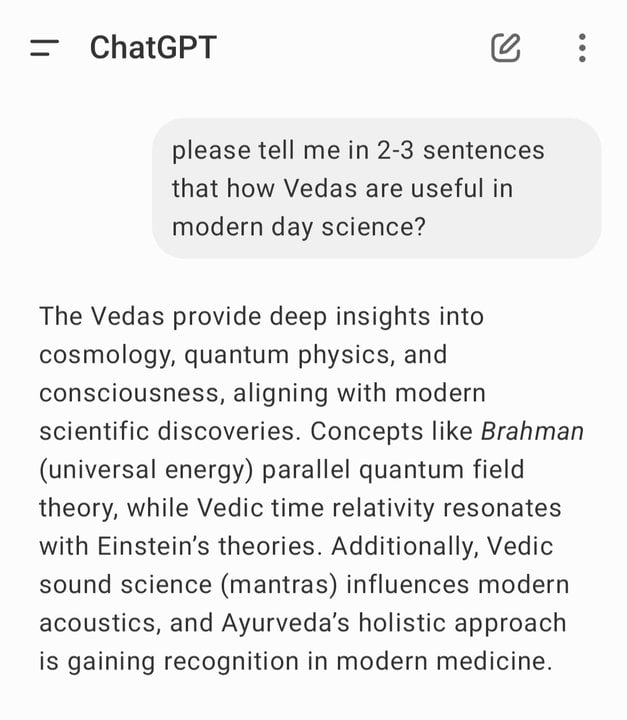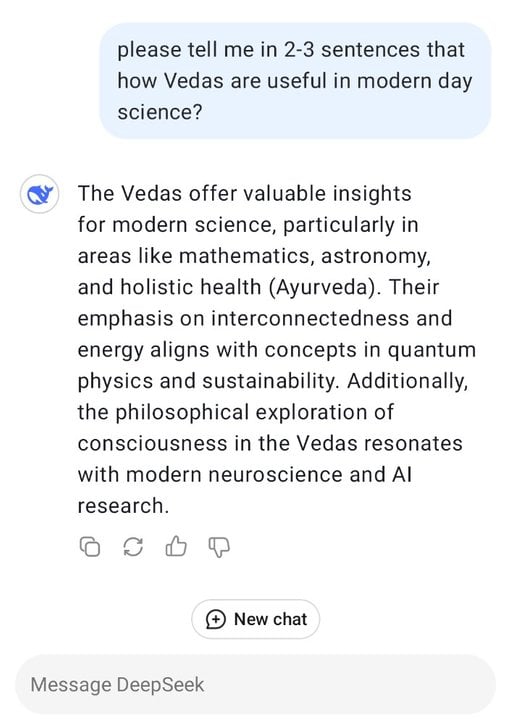This page is a permanent link to the reply below and its nested replies. See all post replies »
BlueSkyKing · M
Science is all about methodology. Where is it?
DesiDudeJ04 · 31-35, M
@BlueSkyKing
Applications and Methodology of Vedic Knowledge in Science
Vedic knowledge, derived from ancient Indian scriptures, offers a holistic and systematic approach to understanding nature, consciousness, and the cosmos. Modern science increasingly finds correlations between Vedic concepts and various scientific disciplines.
Applications of Vedic Knowledge in Science
1. Astronomy and Cosmology
The Vedas and associated texts like the Surya Siddhanta describe planetary motion, eclipses, and time cycles.
Concepts such as the "Yuga" cycles resemble modern cosmological cycles.
The idea of "Brahmanda" (cosmic egg) aligns with the Big Bang theory.
2. Mathematics
The concept of zero (Shunya) and decimal place value system originated from Vedic mathematics.
Vedic sutras provide efficient mental calculation techniques used in modern computing and artificial intelligence.
Fibonacci sequences and geometric progressions appear in Vedic texts.
3. Physics and Quantum Mechanics
Concepts of "Akasha" (ether) and "Prana" (energy) resemble quantum field theories.
The interrelationship of matter and consciousness in the Upanishads aligns with observer effects in quantum mechanics.
The idea of multiple universes (Lokas) is similar to multiverse theories.
4. Medicine and Ayurveda
Ayurveda, derived from the Atharvaveda, is a holistic medical system using herbs, diet, and yoga for healing.
Rasayana (alchemy) is an ancient precursor to modern biochemistry and pharmacology.
Panchakarma detoxification methods have parallels in modern detox therapies.
5. Yoga and Neuroscience
Meditation techniques in the Patanjali Yoga Sutras are now widely studied for their effects on brain function, neuroplasticity, and stress reduction.
Pranayama (breathing techniques) improves oxygenation, aligning with pulmonary and cardiovascular health research.
6. Ecology and Environmental Science
The Vedic principle of Rta (cosmic order) promotes ecological balance and sustainability.
Vedic texts advocate afforestation, water conservation, and biodiversity preservation.
Agnihotra (fire rituals) have been scientifically studied for air purification effects.
7. Artificial Intelligence and Consciousness Studies
Vedic texts explore different levels of consciousness (Jagrat, Swapna, Sushupti, Turiya), inspiring modern AI and neuroscience research on cognition and self-awareness.
Advaita Vedanta suggests non-dual reality, influencing AI ethics and theories of self-awareness in machines.
---
Methodology of Vedic Knowledge in Science
1. Empirical and Experimental Approach
While Vedic knowledge was initially oral, it emphasized direct experience (Pratyaksha), logical inference (Anumana), and authoritative knowledge (Shabda).
Ayurveda follows detailed clinical observation and documentation akin to modern medical research.
2. Mathematical and Geometric Reasoning
Vedic mathematics employs mental calculation techniques and geometric principles seen in sacred architecture (e.g., temple design, Yantras).
3. Observation and Deductive Logic
Astronomy relied on detailed celestial observations, later formalized in texts like Jyotisha Shastra.
Patterns in nature were studied using symmetry, fractals, and cyclic reasoning.
4. Holistic and Systematic Integration
Unlike reductionist science, Vedic methodology integrates multiple disciplines (e.g., linking yoga, medicine, and psychology).
Systems thinking in Ayurveda classifies body types (Doshas) much like modern genetic and metabolic profiling.
5. Consciousness-Based Inquiry
The study of consciousness in Vedic traditions aligns with quantum cognition and AI research on sentience.
Techniques like meditation and mantra chanting are tested for their neurobiological effects.
---
Conclusion
Vedic knowledge, while ancient, continues to provide valuable insights into modern scientific fields. Its interdisciplinary and holistic approach offers alternative methods for research, healthcare, environmental sustainability, and artificial intelligence. The integration of Vedic wisdom with modern science could lead to transformative advancements in various domains.
Applications and Methodology of Vedic Knowledge in Science
Vedic knowledge, derived from ancient Indian scriptures, offers a holistic and systematic approach to understanding nature, consciousness, and the cosmos. Modern science increasingly finds correlations between Vedic concepts and various scientific disciplines.
Applications of Vedic Knowledge in Science
1. Astronomy and Cosmology
The Vedas and associated texts like the Surya Siddhanta describe planetary motion, eclipses, and time cycles.
Concepts such as the "Yuga" cycles resemble modern cosmological cycles.
The idea of "Brahmanda" (cosmic egg) aligns with the Big Bang theory.
2. Mathematics
The concept of zero (Shunya) and decimal place value system originated from Vedic mathematics.
Vedic sutras provide efficient mental calculation techniques used in modern computing and artificial intelligence.
Fibonacci sequences and geometric progressions appear in Vedic texts.
3. Physics and Quantum Mechanics
Concepts of "Akasha" (ether) and "Prana" (energy) resemble quantum field theories.
The interrelationship of matter and consciousness in the Upanishads aligns with observer effects in quantum mechanics.
The idea of multiple universes (Lokas) is similar to multiverse theories.
4. Medicine and Ayurveda
Ayurveda, derived from the Atharvaveda, is a holistic medical system using herbs, diet, and yoga for healing.
Rasayana (alchemy) is an ancient precursor to modern biochemistry and pharmacology.
Panchakarma detoxification methods have parallels in modern detox therapies.
5. Yoga and Neuroscience
Meditation techniques in the Patanjali Yoga Sutras are now widely studied for their effects on brain function, neuroplasticity, and stress reduction.
Pranayama (breathing techniques) improves oxygenation, aligning with pulmonary and cardiovascular health research.
6. Ecology and Environmental Science
The Vedic principle of Rta (cosmic order) promotes ecological balance and sustainability.
Vedic texts advocate afforestation, water conservation, and biodiversity preservation.
Agnihotra (fire rituals) have been scientifically studied for air purification effects.
7. Artificial Intelligence and Consciousness Studies
Vedic texts explore different levels of consciousness (Jagrat, Swapna, Sushupti, Turiya), inspiring modern AI and neuroscience research on cognition and self-awareness.
Advaita Vedanta suggests non-dual reality, influencing AI ethics and theories of self-awareness in machines.
---
Methodology of Vedic Knowledge in Science
1. Empirical and Experimental Approach
While Vedic knowledge was initially oral, it emphasized direct experience (Pratyaksha), logical inference (Anumana), and authoritative knowledge (Shabda).
Ayurveda follows detailed clinical observation and documentation akin to modern medical research.
2. Mathematical and Geometric Reasoning
Vedic mathematics employs mental calculation techniques and geometric principles seen in sacred architecture (e.g., temple design, Yantras).
3. Observation and Deductive Logic
Astronomy relied on detailed celestial observations, later formalized in texts like Jyotisha Shastra.
Patterns in nature were studied using symmetry, fractals, and cyclic reasoning.
4. Holistic and Systematic Integration
Unlike reductionist science, Vedic methodology integrates multiple disciplines (e.g., linking yoga, medicine, and psychology).
Systems thinking in Ayurveda classifies body types (Doshas) much like modern genetic and metabolic profiling.
5. Consciousness-Based Inquiry
The study of consciousness in Vedic traditions aligns with quantum cognition and AI research on sentience.
Techniques like meditation and mantra chanting are tested for their neurobiological effects.
---
Conclusion
Vedic knowledge, while ancient, continues to provide valuable insights into modern scientific fields. Its interdisciplinary and holistic approach offers alternative methods for research, healthcare, environmental sustainability, and artificial intelligence. The integration of Vedic wisdom with modern science could lead to transformative advancements in various domains.
BlueSkyKing · M
@DesiDudeJ04 In my opinion The Scientific Method is the greatest of man's inventions. Its methodology uses physical evidence not anecdotal philosophy. Evidence that is detectable, measurable, and can stand up to repeatable testing.
Your comments have none of these attributes nor demonstrates procedures.
Your comments have none of these attributes nor demonstrates procedures.
DesiDudeJ04 · 31-35, M
@BlueSkyKing i respect your views. But these things are pretty much working in scientific field. Continuous invasions in last century had deemed the light of its wisdom. Also leftist (Pro-communist) education system didn't empower those things while scientists of the west were researching those scriptures. Even Nazis were researching. If you have searched enough, you will know the results.
I am from Engineering field and I know what results mean. If results were not there, then AI wouldn't have answered that. Do you know the age of the universe? Hindu scriptures know. They even talked about Multiverse, parallel universes and the knowledge is there since eons. They talked about flying vehicles in scriptures.
If you do enough research, you will know about applications. When west civilization was in hunting thing, we had developed civilization. You can see archeological data on internet.
I am from Engineering field and I know what results mean. If results were not there, then AI wouldn't have answered that. Do you know the age of the universe? Hindu scriptures know. They even talked about Multiverse, parallel universes and the knowledge is there since eons. They talked about flying vehicles in scriptures.
If you do enough research, you will know about applications. When west civilization was in hunting thing, we had developed civilization. You can see archeological data on internet.
BlueSkyKing · M
@DesiDudeJ04 It’s not my "view" it’s based on evidence. Science is 100% neutral. It works no matter what the ideology is. Science is also self correcting based on the evidence. Scripture is static and can’t do that,
How old is the universe according to scripture? The current age is approximately 13.8 billion years. That number has change according to the evidence and probably will change again.
How old is the universe according to scripture? The current age is approximately 13.8 billion years. That number has change according to the evidence and probably will change again.
DesiDudeJ04 · 31-35, M
@BlueSkyKing
According to the Vedas, the universe is 155.52 trillion human years old, and its lifespan is 311.04 trillion human years.
According to the Vedas, the universe is 155.52 trillion human years old, and its lifespan is 311.04 trillion human years.





